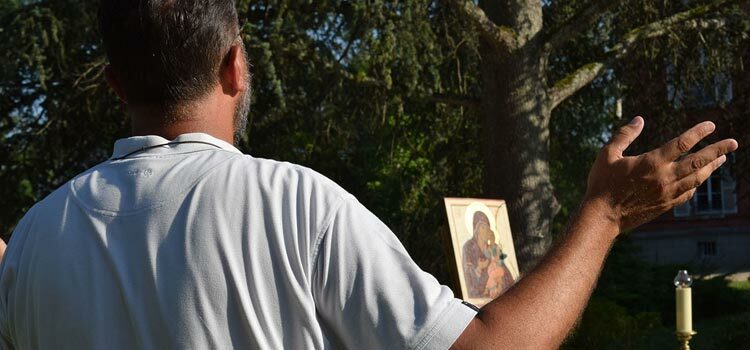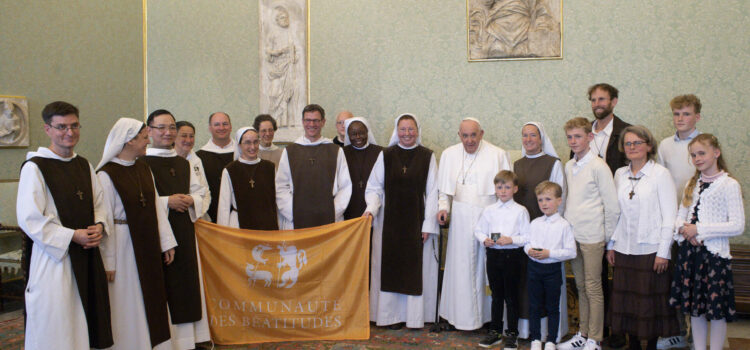In spiritual life, and particularly in orison, we can experience periods of barrenness. Prayer becomes heavy and boring, we don’t feel anything, thoughts go in all directions without succeeding to settle, time passes very slowly… This aridity can have various reasons.
Barrenness when calles to fight
A first possible cause is a certain spiritual laziness. The flowers of a garden that is not watered enough inevitably end up withering. Are we careful enough to give our soul what it needs in order to remain wakeful and earnest in its desire for God ? Spiritual laziness can take on many forms :ittle fidelity to prayer (the less we pray, the less we want to pray…), lack of vigilance to provide our soul with what can stimulate it (readings, retreats, nourishing teachings, spiritual accompaniment that requires regular updates on one’s life, sacramental practice, confession in particular). A frequent reason for barrenness is also a flight from the Cross, too much search for ease and comfort, human satisfactions ; not accepting willingly the annoyances and hindrances of life ; refusing all the small sacrifices which strengthen a soul.
Another cause can also be to invest excessively in affective ties, or to be too passionate for such and such an activity (work, sport, social networks or another field, even in apostolates sometimes!) so that ultimately there is not much room left in the heart for God.
Behind lazyness, there are often deeper reasons. One of them is the fear to surrender completely to God. We have an inkling that if we really get seriuous about prayer, God is going to attack the state of mediocrity we have settled in. What can make you lazy is also a certain despondency : the feeling of not moving forward, of always dragging out the same difficulties, of falling back into the same faults. To give courage back to the soul, it is necessary to give it again some hope, an absolute trust in God’s mercy.
Psychological reasons
A second cause for barrenness can be a psychological. Too much weariness, tension, stress, can make prayer difficult, or even impossible. St John of the Cross-speaks of « melancholy », in modern terms one would speak of depression, burn-out or other psychological situations, with no fancy for anything, a kind of apathy, a refusal of life. In those cases, one has of course to start by curing, as much as possible, these human problems, before dealing with the question on a spiritual level. Sometimes, one speaks about a « spiritual night » too easily, in situations that have little to do with it.
With God’s permission
The third possible cause for barrenness is of a spiritual nature. Difficulties and poverty in the practice of prayer invite us to base our relationship with God, not only on what we have tasted, or on representations or images on which we used to rely on, but more on an act of faith. What can be felt or tasted of God is not God, and what we can imagine or depict about God is not God. In order to deepen our contact with God, whichis only given by faith, it is necessary to go through deprivation of sensitive experiences and of the representations of our imagination. These are not bad but the risk is to get bogged down, whereas by walking in simple and pure faith, we walk on a much safer path.
We have simply to consent to this barrenness allowed by God. It is uncomfortable but it is an opportunity to practice a stronger and purer faith, because it rests on God only.
According to St John of the Cross, this entry into barrenness is often linked to an evolution in our prayer life, the transition from « meditation » to « contemplation ». It is a matter of entering, little by little in a way of praying where human activity is much more reduced, more simple, more receptive than active. Prayer becomes a simple, general and loving attention to God, without emotions or special representations to support it.
St John of the Cross-gives three criteria for recognizing this type of barrenness, which must be held together. The first is that, while previously it found joy and pleasure in praying, the soul experiences great difficulty and loathing to meditate, reflect, pray, consider particular realities. The second is that this difficulty in meditating comes neither from the laziness mentioned above (for then the person has on the other hand a strong desire to take care of a thousand other things than God), nor from the forms of psychological apathy we have already mentionned. The third test is that a person, although his/her prayer be poor, does not really feel like getting interested in anything else but God (maintains great concern for God, a fear of not loving Him enough) and begins to feel an inclination to remain quiet, silent, without any special activity, except for a general and loving attention of the heart to God. He/she may have some qualms about following that inclination, because he/she feels he’s/she’s not doing anything, but has to move in that direction. Sensitivity can be arid, thoughts wander to the right and left as usual, but the heart is present by a simple and loving attitude of attention to God.
There is therefore true prayer, an authentic act of faith and love, which gradually deepens and becomes very fruitful.
Barrenness is sometimes a problem, which has to be taken care of, but is can also be a great grace, the doorway to contemplation, meaning a prayer which is more receptive, more simple and reduced to essentials, through which God secretly communicates himself to the soul and enriches it with great goods.
The Quotation
« If we accept spiritual trials, it isn’t because we wish to reach perfection for it would include a certain exaltation of our ego. It is in order to submit to God’s plan and fulfill his will. » Père Matta el-Maskîne
To Go Further…Just for today:
Book :
|
Find the previous articles in our “Life of prayer” series.
(publication edited by brothers and sisters of the Community of the Beatitudes – © rights reserved).






